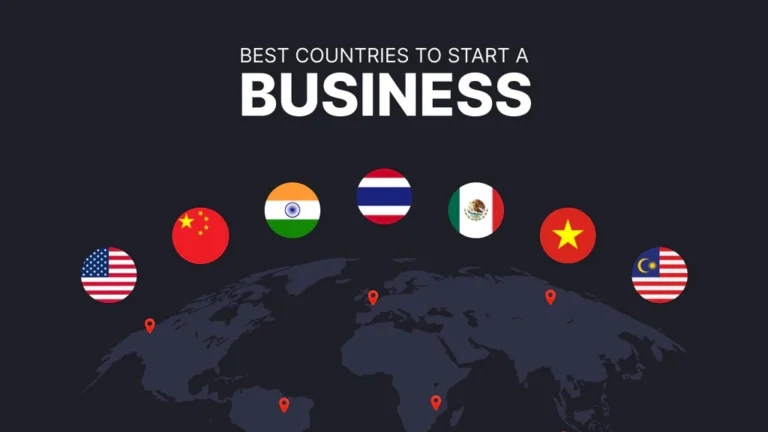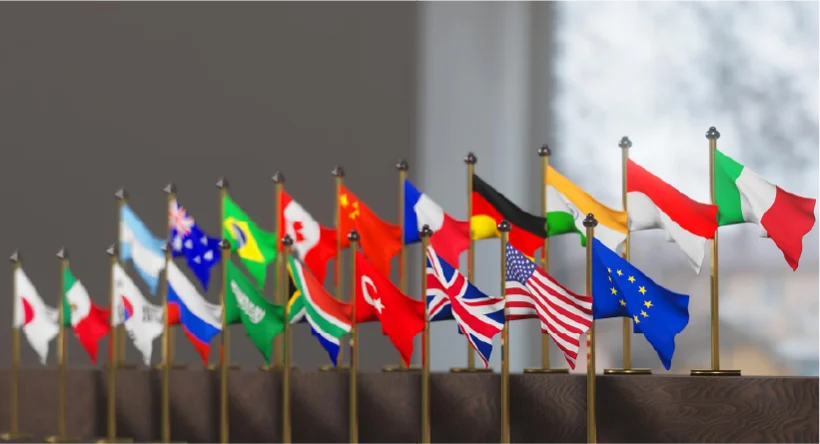Top 10 Countries for starting a Business and to make Money and Profits!
Posted On September 5th, 2025
Array
Countries, business, profit, money — these four words capture the essence of global entrepreneurship, and in today’s fast-changing world, choosing the right countries to start or expand your business can determine how much profit you make and how effectively you grow your money. With markets evolving, governments offering tax incentives, and new opportunities opening up for non-resident business owners, it has never been more important to understand which destinations truly deliver high profits. In this detailed guide, we’ll explore the top 10 countries where doing business is not only practical but also highly profitable, while also breaking down what industries thrive best and what facilities are available for international entrepreneurs.
How I chose the countries?
To keep this guide practical, I focused on places that combine:
- Pro-business taxes and policy (clear corporate tax rules, incentives, and low friction).
- Strong market access (large local demand or easy access to global customers).
- Facilities for non-resident founders (you can own or operate companies from abroad).
- Sectors with proven money-making potential (what actually earns profit today).
You’ll also see what each country is good for, what businesses work best, and which facilities help non-resident owners launch and scale.
Sources are linked throughout each section so you can verify every claim quickly.
1) United Arab Emirates (UAE): Business Hub with velocity—business, profit, money at speed
Why the UAE for business and profit
The UAE is a magnet for international business thanks to free zones, top-tier logistics, and simple taxes. Since 2023 the UAE levies a federal corporate tax of 9% (0% up to AED 375,000), with special rules for large multinationals; many free zone entities can still access a 0% rate on qualifying income when they meet the conditions. These changes make policy clearer while keeping the jurisdiction attractive for profit.
What businesses make money
- Cross-border e-commerce and trading via hubs like JAFZA or DMCC (gold, diamonds, commodities, crypto/web3 services under regulated frameworks).
- Professional services (consulting, marketing, tech) that invoice globally from a UAE base.
- Logistics and re-exports leveraging world-class ports and air cargo routes.
Facilities for non-resident owners
- 100% foreign ownership now possible onshore in most activities, and standard in free zones; plus common-law commercial courts in ADGM/DIFC, strong banking, and straightforward online incorporation. Corporate tax treatment depends on mainland vs. free zone status and activity, so plan early.
2) Singapore: Country where business, profit, money align with efficiency
Why Singapore for business and profit
Singapore offers a flat corporate tax rate of 17%, with start-up and partial tax exemptions that often lower effective rates for SMEs. Policy is stable, banking is world-class, and rule of law is strong—ideal for money management and predictable profit.
What businesses make money
- Regional HQs for SaaS, fintech, B2B marketplaces, and wholesale distribution across ASEAN.
- High-margin services (asset-light consulting, productized services, licensing).
- Deep-tech and biotech—supported by targeted grants and an innovation ecosystem via EDB/MOF.
Facilities for non-resident owners
- Foreigners can incorporate remotely through a filing agent; you’ll need at least one local director (often fulfilled via corporate services) and can later obtain work authorizations (e.g., EntrePass/Employment Pass) as needed.
3) United States: Country with scale—business, profit, money at massive market size
Why the U.S. for business and profit
No consumer market matches the U.S. for money-making potential when product-market fit clicks. Access to deep capital markets, enterprise buyers, and federal/state procurement add to the business opportunity. For foreign-owned entities, be mindful of IRS Form 5472 obligations for foreign-owned single-member LLCs (file Form 5472 attached to a pro-forma Form 1120).
What businesses make money
- B2B SaaS with clear ROI.
- Specialized services and agencies (AI, analytics, compliance) selling to mid-market and enterprise.
- E-commerce brands using U.S. fulfillment for Prime-speed delivery.
Facilities for non-resident owners
- Non-residents commonly form LLCs or C-corps at the state level; check SBA’s launch and export guidance, and plan for state/federal registrations and sales tax nexus rules. For government contracts, SBA size-standards and U.S. presence apply.
4) United Kingdom: Country with clarity—business, profit, money with transparent rules
Why the UK for business and profit
The UK combines a large, affluent market with fast online incorporation and strong contract enforcement. Non-resident directors are allowed; there’s no requirement for a UK-resident director to form a private limited company.
What businesses make money
- Professional and creative services selling across the EU/US from a UK base.
- Fintech and reg-tech (London remains a leading financial hub).
- Online education and publishing leveraging English-language distribution.
Facilities for non-resident owners
- Companies House allows remote incorporation, non-resident directors, and digital filings. Banking requires KYC; fintech business accounts can speed setup while you establish proof of trading.
5) Ireland: Country that turn business into profit and money with talent and tax
Why Ireland for business and profit
Ireland’s headline 12.5% corporate tax on trading income and deep tech talent make it a favorite for European business hubs. The R&D tax credit increased to 30%, improving after-tax profit for innovative firms.
What businesses make money
- SaaS and platform companies targeting the EU/UK.
- Medtech and pharma services plugged into Ireland’s manufacturing base.
- Gaming and digital media tapping multilingual talent.
Facilities for non-resident owners
- You can incorporate as a non-resident; if no EEA-resident director, the company must put a Section 137 bond in place or secure a certificate confirming adequate Irish ties. Plan this early with your formation agent.

6) Hong Kong (SAR): Country where business meets money via simple, territorial tax
Why Hong Kong for business and profit
Hong Kong’s territorial system taxes only Hong Kong-sourced profits, and its two-tier Profits Tax is 8.25% on the first HKD 2 million for corporations and 16.5% above that. That simplicity, plus deep banking and China-plus-one positioning, supports profit.
What businesses make money
- Cross-border trade and sourcing, especially APAC distribution.
- Professional and family-office services that bill clients worldwide.
- Niche fintech and payment services under Hong Kong’s regulatory frameworks.
Facilities for non-resident owners
- Foreigners can incorporate and own 100% of a company; InvestHK provides hands-on setup guidance for visas, space, and service providers. Note: keep abreast of policy shifts and banking KYC requirements.
7) Switzerland: Country where quality business compounds into profit and money
Why Switzerland for business and profit
Switzerland blends stability, IP protection, and high-end talent. Corporate income tax is levied at federal (8.5% on profit) plus cantonal/communal rates, with combined rates varying by canton (often in the mid-teens to low-20s). It ranks among the world’s most innovative ecosystems, which translates into durable profit for high-value niches.
What businesses make money
- Medtech, biotech, and precision engineering.
- Wealth management, asset management, and reg-tech.
- Premium consumer goods with strong margins (watch components, niche luxury).
Facilities for non-resident owners
- Switzerland Global Enterprise (S-GE) and cantonal promotion agencies help with site selection, permits, and labor—useful for non-resident founders exploring multiple cantons.
8) Canada: Country where business scales and converts to profit and money with incentives
Why Canada for business and profit
Canada offers a 15% federal corporate tax (plus provincial rates), world-class research institutions, and the heavyweight SR&ED R&D tax credit (basic 15% ITC, with an enhanced 35% rate for eligible corporations). Canada also runs a Start-up Visa for immigrant entrepreneurs. These combine into meaningful after-tax profit.
What businesses make money
- AI, clean tech, life sciences—SR&ED can materially lower your effective costs.
- Near-U.S. market plays for software and services that sell into American buyers.
- Advanced manufacturing and ag-food tech with provincial incentives.
Facilities for non-resident owners
- Federal incorporation is possible without a resident-director quota under the modernized CBCA (check your province if you incorporate provincially). You must maintain an Individuals with Significant Control (ISC) register and standard compliance. For immigration, the Start-up Visa offers a path when backed by a designated investor.
9) Netherlands: Country that turn business structure into profit and money with design
Why the Netherlands for business and profit
The Netherlands provides EU market access, strong logistics, and innovation-friendly policy. Corporate income tax (Vpb) uses two brackets (recent years: a lower rate around 19% up to a threshold and 25.8% above; confirm the current year at Belastingdienst). The Innovation Box can significantly lower effective tax on qualifying IP income, and the 30% ruling benefits eligible inbound employees—useful for talent-heavy business.
What businesses make money
- Logistics, e-commerce fulfillment, and EU distribution (Rotterdam/Schiphol).
- Climate tech, ag-tech, and hardware startups leveraging world-leading supply chains.
- Fintech and B2B SaaS with EU scale.
Facilities for non-resident owners
- Straightforward BV incorporation, robust treaty network, and English-friendly administration. The 30% ruling helps you attract specialized foreign employees at lower total compensation cost.
10) Vietnam: Country where cost, business, profit, money meet in fast growth
Why Vietnam for business and profit
Vietnam’s standard corporate income tax is 20% and the country actively courts high-tech and manufacturing investment with tax holidays and cash-grant discussions. The government has advanced proposals for an investment support fund and is pushing semiconductor incentives, reflecting its move up the value chain.
What businesses make money
- Manufacturing (electronics assembly, components, furniture, apparel) with export focus.
- Supplier enablement services (quality assurance, logistics, tooling).
- Emerging tech (chip assembly/testing, embedded software, AI services) as incentives grow.
Facilities for non-resident owners
- Vietnam allows 100% foreign ownership in most sectors, with market-access restrictions listed under Decree 31/2021. High-priority projects may obtain tax holidays and accelerated approvals; stay current on 2025 CIT-law updates introducing revenue-tiered rates for small enterprises while keeping the 20% headline rate. Work with counsel to map your exact business code and license path.
Countries, business, profit, money — best-fit ideas by sector
To help you match business to country for maximum profit and money:
- Global B2B SaaS: Singapore or Ireland (regional/EU access, IP incentives).
- Fintech/Wealth services: UK, Switzerland, Hong Kong (financial hubs, talent, clear licensing).
- Cross-border e-commerce & trading: UAE and Hong Kong (customs-friendly hubs, free zones/territorial tax).
- Deep-tech/biotech: Ireland, Switzerland, Canada (R&D credits, clusters).
- Manufacturing & assembly: Vietnam and the Netherlands (APAC cost base vs. EU logistics node).
Facilities snapshot for non-resident owners (what to expect, country by country)
- UAE: 100% foreign ownership now standard onshore for most activities; free zones grant straightforward setup and, for qualifying activities, a 0% free-zone rate (subject to rules). Banking/KYC and corporate tax classification planning are key.
- Singapore: Incorporate remotely, but appoint one local director; robust work-pass routes (EntrePass/EP) after traction.
- USA: Form at the state level; foreign-owned single-member LLCs must attach Form 5472 to a pro-forma Form 1120 when required—missing filings carry significant penalties.
- UK: Non-resident directors allowed; digital filings via Companies House.
- Ireland: If you lack an EEA-resident director, put a Section 137 bond in place or qualify for an exemption certificate.
- Hong Kong: 100% foreign ownership with simple incorporation; keep rigorous books for source-of-profits analysis under the territorial system.
- Switzerland: Choose canton carefully; engage with S-GE and cantonal offices for location incentives and fast timelines.
- Canada: Federal corporations operate under a modernized CBCA; maintain an ISC register; leverage SR&ED and consider the Start-up Visa if immigrating.
- Netherlands: BV formation is straightforward; Innovation Box and 30% ruling can materially improve after-tax returns and hiring.
- Vietnam: Confirm your business line against Decree 31’s market-access list; incentives (tax holidays/reductions, land) target high-tech and large-scale projects; monitor 2025 CIT-law changes.
Countries, business, profit, money — tactical playbook to actually execute
- Pick the corporate base for your revenue model
- Services/SaaS selling worldwide: Singapore, Ireland, UK.
- Asset-light trading: UAE or Hong Kong.
- Manufacturing with export focus: Vietnam (production) + Netherlands (EU distribution).
- Regulated finance or premium IP: Switzerland (and UK).
This increases profit by fitting your business to the regulatory and tax reality of each country.
- Design your tax and compliance map early
- Understand corporate tax rates, special regimes (free-zone/innovation boxes), and R&D credits. Set accounting and TP documentation from day one to protect money and profit at audit time.
- Open the right banks and PSPs
- Choose banks and payment processors experienced with foreign-owned entities; KYC is smoother in the UAE free zones, Singapore, UK, and HK when your documentation is clean. (Government and tax-authority pages cited in each country section explain what regulators expect.)
- Use visas and talent programs
- Canada (Start-up Visa), Singapore (Employment Pass/EntrePass), UK (business immigration routes), UAE (residence via company), **Netherlands 30% ruling for talent). These choices speed hiring and reduce payroll friction, improving profit.
- Sequence your presence
- Start with a sales entity (in a country that simplifies invoicing and currency flows), then add ops/manufacturing entities where costs are low and incentives exist. This keeps money flexible and profit optimized.
Quick risk notes (real-world things that move the needle)
- Policy evolves: UAE free-zone rules and qualifying income criteria continue to be clarified; check the latest ministerial decisions before relying on 0% projections. Hong Kong maintains two-tier rates, but fiscal policy can change—watch budgets. Vietnam’s CIT Law 2025 introduces new revenue-tiered rates for smaller firms while keeping the 20% headline. Staying current protects money and profits.
- Substance matters: Preferential regimes increasingly require real substance (people, premises, or genuine management). Build your operating model accordingly. (See official tax-authority guidance linked above.)
- Banking/KYC: New companies owned by non-residents face strict checks. Use reputable formation agents and keep proof of source of funds and contracts ready.
- Transfer pricing: Intercompany pricing across countries needs documentation; this preserves profit and avoids double taxation later.
Conclusion
If you want profits and money from your business, start where rules are clear, banking works, and incentives align with your model:
- UAE/Singapore to run lean HQs and invoice globally.
- UK/Ireland/Netherlands to sell into Europe with trusted legal frameworks.
- Hong Kong for APAC trade and territorial taxation.
- Switzerland for premium, IP-heavy businesses.
- Canada when R&D credits and immigration routes can accelerate growth.
- Vietnam when cost-efficient production and fast growth matter most—especially with expanding high-tech incentives.
Pick the country that fits your business mechanics, secure banking early, set tax and compliance right, and then scale. That’s how countries, business, profit, money work together—methodically and profitably.
Want to know How can you Optimize the SEO of your Website effectively? Click here to see.
Related Posts

What is WordPress? What are its functions?
Posted on January 22nd, 2026
WordPress is a high-performance CMS that serves as the backbone for SEO and digital marketing by offering a scalable architecture for content, plugins, and technical optimization. It enables digital...
Read More →
How to Improve SEO in 2026
Posted on January 18th, 2026
To improve SEO, you must master how to improve SEOby prioritizing Answer Engine Optimization (AEO) and AI Overviews (AIO). Success in how to improve SEO in 2026 requires a...
Read More →
What are Moz , Semrush, and Ahrefs SEO?
Posted on January 16th, 2026
Moz, Semrush, and Ahrefs are the “Big Three” of the SEO (Search Engine Optimization) world. They are software-as-a-service (SaaS) platforms that help website owners, marketers, and bloggers understand how...
Read More →
Why GEO is Essential for Modern SEO and Digital Marketing Success
Posted on January 10th, 2026
GEO, or Generative Engine Optimization, is the strategic process of optimizing digital content to be cited, summarized, and recommended by AI-powered search engines. In 2026, GEO, SEO, and digital...
Read More →© All Copyright Reserved japjitravel.com
Leave a Comment :